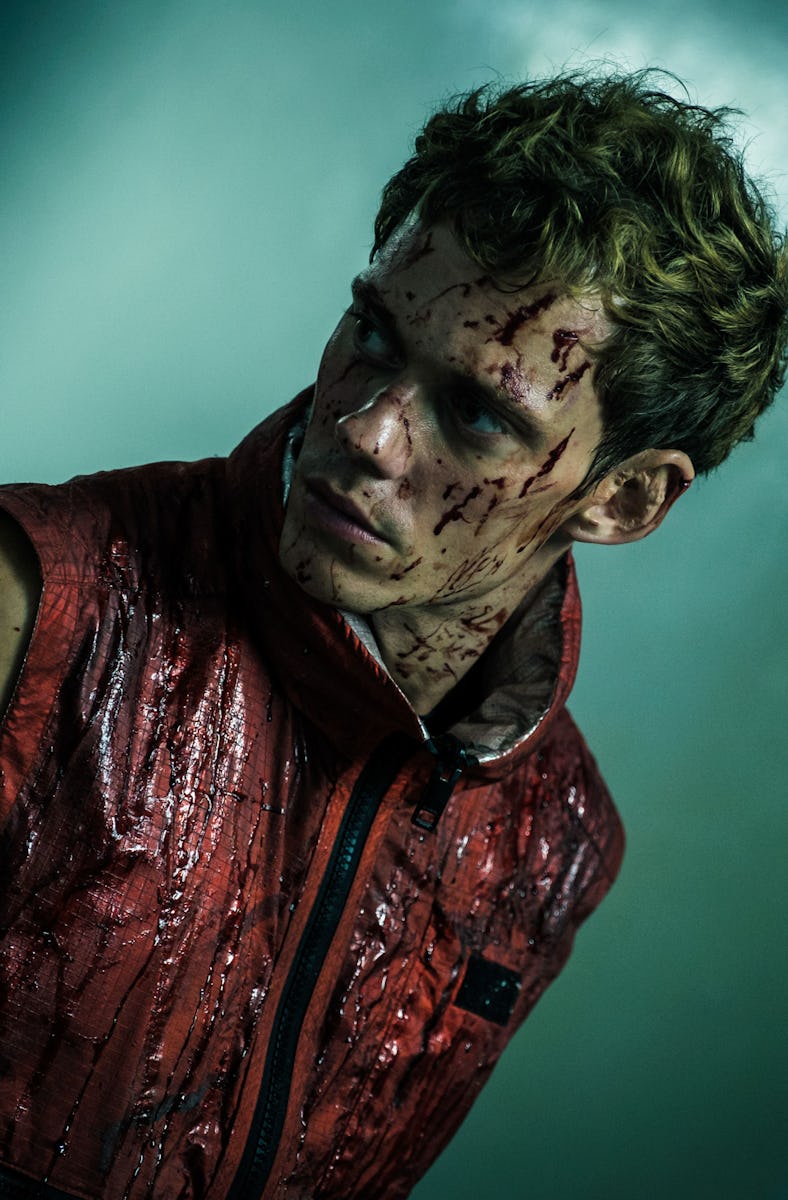Boy Kills World is a Gnarly Dose of Bone-Crunching Mayhem
The most juvenile revenge thriller of the year has arrived.

Boy Kills World is the product of a dozen different, easily identifiable influences. The visually kinetic, handheld style of its fight sequences inevitably calls to mind Gareth Evans' acclaimed Raid films — and the presence of Indonesian martial artist Yayan Ruhian in the new thriller only makes that connection all the more apparent. Boy Kills World's cartoonish instances of eye-popping blood and gore reveal an additional debt to the tone-busting work of one of its producers, Evil Dead II filmmaker Sam Raimi, while its running narration and tongue-in-cheek sense of humor give it the same kind of winking edge made popular by Ryan Reynolds' Deadpool movies.
With its boss-level-style plot and its heightened aesthetic, Boy Kills World also feels greatly influenced — sometimes consciously and other times not — by both video games and graphic novels. As wide-ranging as its references are, though, first-time director Moritz Mohr's genre-bending revenge thriller never fully outgrows the many titles that clearly inspired it. It does, however, successfully synthesize them into a 110-minute, beat-’em-up action extravaganza that one would be hard-pressed to call "original"... but is certainly entertaining.
The first voice you hear in Boy Kills World doesn't belong to its star, Bill Skarsgård, but Bob's Burgers and Archer voice actor H. Jon Benjamin, whose opening narration sets up the state of the film's dystopian world and the plight of its protagonist. In the same prologue, we learn that Boy Kills World's unnamed hero (Skarsgård) was rendered deaf and mute at a young age by Hilda van der Koy (Famke Janssen), the head of a corrupt family of former revolutionaries turned tyrants, who killed both his mother and his sister, Mina (Quinn Copeland).
Rescued from death and trained to fight by a mysterious rebel known only as "The Shaman" (Ruhian), Skarsgård's determined resistance fighter sets out to take down not only Janssen's Hilda, but also her brother Gideon (Brett Gelman), sister Melanie (Michelle Dockery), brother-in-law Glen (Sharlto Copley), and the van der Koys’ merciless head of security, June 27 (a hatchet-wielding Jessica Rothe). His quest is narrated by his inner voice, which comes courtesy of Benjamin and is stolen from an arcade game that Skarsgård's ambitious protagonist played when he was a young boy. The film, to its credit, mines plenty of off-kilter comedy out of the juxtaposition of its lead's horrifically violent escapades and the jovial tone of Benjamin's voice.
That Boy Kills World's central inner voice gimmick works as well as it does is a testament to Skarsgård's central performance. The actor got in astonishingly good shape for the film and that's made clear early on, but it's the balance he finds between action and comedy that makes his work here so special. He effectively sells every punch, kick, and cheese grater attack (yes, you read that correctly) he unleashes, but he also brings a wide-eyed kind of enthusiasm and naïveté to his performance that frequently synchs up well with Benjamin's purposefully over-the-top vocal turn and subtly highlights the arrested-development nature of his character. It's an intense and yet lighthearted performance, and it prevents Boy Kills World from ever drifting too far into either darkness or levity.
Bill Skarsgård’s intensely physical central performance grounds Boy Kills World and keeps it from ever completely losing its footing.
Many of the film's supporting characters are too underwritten to let their performers make much of a mark playing them, including Dockery, Janssen, and Copley's one-note villains, along with Andrew Koji’s Basho, a fellow rebel who serendipitously joins up with Skarsgård's anonymous fighter. Of the movie's van der Koy antagonists, only Gelman's Gideon is given anything resembling extra dimensions. Ultimately, though, it's Rothe who makes the biggest impression opposite Skarsgård. The Happy Death Day star is, as she has often been throughout her career, criminally underutilized in Boy Kills World, but she nonetheless steals several scenes and brings gravitas to a few key moments in the film's second half.
What it lacks in character development, the movie makes up for in hard-hitting action. Mohr and action director Dawid Szatarski fill Boy Kills World with memorable setpieces and fights, including a second-act warehouse assault that finds the right blend of screwball comedy and gory brutality, as well as a climactic brawl involving Skarsgård, Rothe, and Ruhian that easily ranks as one of the year's best action sequences. Those who go into Boy Kills World wanting it to deliver on the bloody, bone-breaking promises of its trailers won't be disappointed.
Unfortunately, the precision of the film's style and action isn't reflected in its tone. The movie struggles, at times, to find the right tonal balance between comedy and drama. A recurring gag involving its protagonist's inability to read the lips of Benny (Isaiah Mustafa), a friend of Koji's Basho, never really lands, and ends with a misplaced moment of glib humor. While Boy Kills World's desire to complicate its seemingly straightforward story in its final third is appreciated, too, Tyler Burton Smith and Arend Remmers' script doesn't take the time necessary to develop its post-apocalyptic world or villains enough for the movie's last-minute grab at a certain kind of emotional catharsis to succeed.
Jessica Rothe gives a scene-stealing turn in Boy Kills World.
The good news is that Boy Kills World's narrative issues don't make watching it any less fun. The movie's superficiality keeps it from ever reaching instant classic status, but it moves at a brisk pace and features a number of genuinely pulse-pounding fights. It's a gloriously juvenile, gruesome action movie that lands a lot of the punches it throws — even if only a few of them hit hard enough to actually leave much of a bruise.